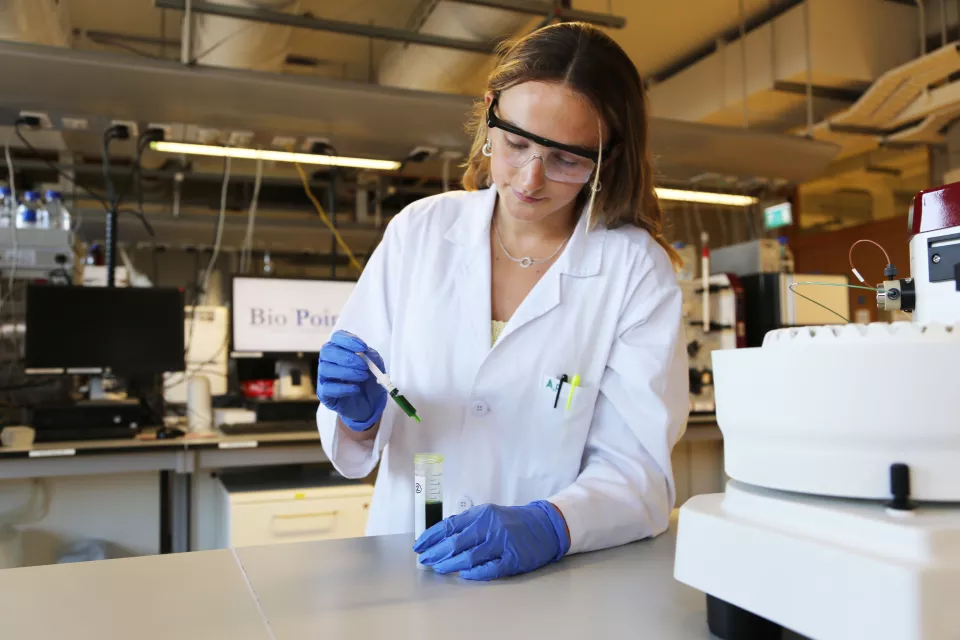
Course: Industrial Biochemistry
Supervisor: JJ Leahy
Name of Research Project/Activity: Quantification and identification of furanocoumarins using HPLC- Q-TOF.
Q) Can you tell me a bit about yourself, your background, and why you decided to study the course you are taking at UL?
As a student-athlete and a competitive swimmer for the past 12 years, it was the sports facilities and the extensive range of courses that UL has to offer that originally attracted me to the college. Having an Olympic-sized swimming pool along with a state-of-the-art gym on my doorstep here has allowed me to take my training to the next level. For the past two years, I have been training with National Centre Limerick (NCL) which is a high-performance swimming squad based in UL. I swam nine times a week and had strength and conditioning training three times a week using the amazing facilities on campus. Some of my teammates were Olympians and Paralympic world record holders!
I chose to study LM123 due to the broad first year the course offered. Biological and Chemical Sciences in UL has a common entry first year, allowing you to explore four different pathways before deciding between Industrial Biochemistry, Environmental Science, Bioscience or Pharmaceutical and Industrial Chemistry. I chose Industrial Biochemistry as I enjoyed both the biological and chemical side of chemistry and this course offers a mix of both!
Q) What motivated you to apply for the Summer Bursary Programme?
Having enjoyed the content of year one of Biological and Chemical Sciences in UL I completed the year with a high QCA. I was fortunate enough to be considered for an Undergraduate Programme Summer Training for a Research Track (UPSTaRT). This is a summer bursary for first-year students. I thoroughly enjoyed the research I completed last summer which focused on spray-drying conjugated proteins and as such I decided to apply again this year. This summer, I have chosen to focus my research on analytical chemistry. I studied two modules of analytical chemistry this academic year and really enjoyed it.
Q) What are you doing as part of your research here at UL?
My research this summer focuses on extracting plant-material from Giant Hogweed (Heracleum mantegazzianum) and then analysing and quantifying the material using HPLC- Q-TOF. Giant Hogweed is an invasive species which contains linear furanocoumarins, these are one of the leading causes of an inflammatory response upon contact with mammals, especially human skin cells. Furanocoumarins are coumarin derivatives synthesized as secondary metabolites in plants. They are phenolic compounds grouped into two forms; linear and non-linear. Psoralen, Bergapten and Xanthotoxin are all examples of linear furanocoumarins. My research focuses on the extraction using high pressure order of the furanocoumarin Bergapten and its analysis using HPLC- Q-TOF, which is an analytical machine that identifies compounds in a solution according to the mass-to-charge ratio of their ionic species. My research aims to identify which part of the Giant Hogweed plant is most dangerous to mammal skin cells.
Q) What skills have you developed over the summer?
I have developed skills in extraction chemistry using high pressure order to remove the furanocoumarins from the plant material. I have also developed skills in analytical chemistry using high performance liquid chromatography. I used HPLC to separate the analyte from the sample and then I coupled the HPLC with Q-TOF which is a hybrid mass spectrometer combining a single quadrupole and time of flight spectrometer which allowed me to obtain high-resolution results. HPLC- Q -TOF will allow the identification of my analyte and the quantification of the furanocoumarins.
Q) What has this experience taught you and what would you recommend it to others?
I would highly recommend the Science and Engineering Summer Bursary Research Programme to all students as it offers an eye-opening experience into the world of research in UL. I noticed having a summer of research behind me as I began my second year of Industrial Biochemistry gave me the confidence to excel with my coursework in the chemical labs.
Q) What are your future career plans, would you consider a career in research?
Having completed the UPSTaRT Programme last summer and the Summer Bursary Research Programme this summer, I would consider a career in research once I have completed my undergraduate degree.
